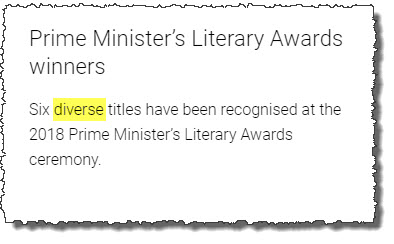
In 2015, Pakistani-British novelist Kamila Shamsie issued a challenge to publishers: publish only women for a year. She was fed up with the gender imbalance in prize winners, review pages and even the books themselves.
Here’s a quick look at that historical imbalance:
- From 1969 to 2018, women have won just 35.2% of Man Booker Prizes and 31.1% of the Miles Franklin Literary Awards.
- From 1979 to 2018, women account for a combined 36.8% of winners of NSW Premier’s, Victorian Premier’s, and Queensland Literary Awards .
- Of the 114 Nobel Prizes for Literature since 1901, just 14 of them (12.3%) have been awarded to women.
- Of the 18 Man Booker-winning books from 2000-2018, just three had female leads (one more had both a man and a woman). In that same period, just one of the 18 Pulitzer Prize winning books featured a female protagonist.
Shamsie acknowledged that there has been progress for women, but asked: “Should we all sit around while the world continues on its slow upward trend towards equality?” She argued we needed to carve out a space for women’s writing and 2018, the centenary of the first time women voted in a UK election, seemed “appropriate”. Only one independent publisher, And Other Stories, accepted.
As we sit on the other side of 2019, still comforted by the artificial freshness of a new start, let’s see what the “Year of Publishing Women” actually looked like.
And the winners are…
The 2018 Man Booker Prize — a frequent topic for debate relating to gender — was a win for women. Anna Burns’ Milkman triumphed (after male authors won the previous four years), and seven of the 13 longlisted authors and four of the six shortlisted authors were women.
Women also won the Neustadt International Prize for Literature Award and the Hugo Best Novel Award. Men won the Pulitzer Prize for Fiction (the fourth year in a row a man has won; in the past ten years, just three women have won) and the Dublin Literary Award. The Costa Book Award (the UK’s most prestigious) winners won’t be announced until later this month, but women make up exactly 50% of the overall shortlist across categories.
At home, the Miles Franklin Award went to Michelle de Kretser for The Life to Come. The longlist featured less than 50% women, however the shortlist was 66.7% women. Women also won the Vogel’s Prize, the Ned Kelly Awards for Best Fiction and Best First Fiction, all six categories of the Victorian Premier’s Literary Awards, the South Australian Premier’s Literary Award, the Australian Literature Society Gold Medal and the Melbourne Prize for Literature Award (and the Civic Choice Award, based on the public’s votes). Three out of four winners of the Sydney Morning Herald’s 2018 Best Young Australian Novelists were women.
The Stella Prize, specifically dedicated to Australian women’s writing, went to Alexis Wright for her collective biography Tracker. Wright is a woman of the Waanyi nation of the Gulf of Carpentaria, for her collective biography Tracker, and five of the six writers featured on the shortlist were women of colour.
“In a year when women’s voices are demanding to be heard, [the Stella] shortlist showcased the power and diversity of writing by women in Australia,” Fiona Stager, chair of the Stella Prize’s judging panel, told Crikey.
Room for improvement?
The Prime Minister’s Literary Awards weren’t so promising. Men won in five out of six categories (the only woman won for “Children’s Literature”). Just 13 out of 30 shortlisters were women (and seven of those came from the young adult and children’s categories). The fiction award went to a man, from a shortlist featuring only one woman.

Men also won the Voss Prize (although five out of six shortlisters were women), six out of 10 categories of the NSW Premier’s Literary Awards (excluding the scriptwriting award, which was won jointly by two sets of male and female co-authors), the ACT Book of the Year, the Colin Roderick Literary Award and the Patrick White Literary Award.
While women won awards in 2018 both locally and abroad, the Prime Minister’s Literary Awards raises questions about how we can get women on shortlists outside of children’s categories.
“I’ve been uncomfortable with the imbalance between male and female writers in terms of the books that get submitted for prizes that I’m judging on a number of occasions,” Shamsie said in 2015. “[Judges can be] hamstrung by publishers who submit with a strong tilt towards books by men.”
Then there’s the question of commercial success. More than half of Amazon editors’ top 20 books in 2018 were by women. And in the 2018 Goodreads Choice Awards, 76.2% of winning authors were women. However, a 2018 study also found that we still pay almost double for books written by men.
There is also a notable gap in further data on writers and the broader publishing industry. In 2016 a US study found that the American publishing industry was 79% white, 78% female, 88% heterosexual, and 7.6% disabled. But similar statistics on the Australian publishing industry don’t exist.
As Natalie Kon-yu has previously pointed out, we’re faced with blank pages where data on women of colour, First Nations women, disabled women, non-binary people, and women who identify as LGBTQ+ should exist. We don’t know how many authors are wealthy; educated; or regional, rural and remote (and as Kon-yu found when attempting the Stella Prize’s first Diversity Count, collecting that data is near impossible).
While it can seem tedious to do this work, the numbers matter. If men win the most literary prizes, we’re taught that good writing equals male writing. The same goes for white writing, straight writing or able-bodied writing.
2018 may have been the “Year of Publishing Women” but, as Shamsie noted almost four years ago, the real challenge was “what would happen in 2019? Would we revert to status quo or would a year of radically transformed publishing change our expectations of what is normal and our preconceptions of what is changeable?”
“I suggest we find out.”








Bullshit, if ever there was a equal opportunity endevour it would be in literature.
You obviously never heard of JK Rowling, Daniella Steele, Agatha Christie?
Gotta lurve the Mules Franklin being so often won by a man.
Bring back George Eliot, George Sand, the 3 Bell & 2 Lee (Vernon & Harper) brothers, A. M. Barnard, Robert Galbraith, Isak Dinesen and a great sci-fi author James Tiptree Jnr, all these blokes could really write.